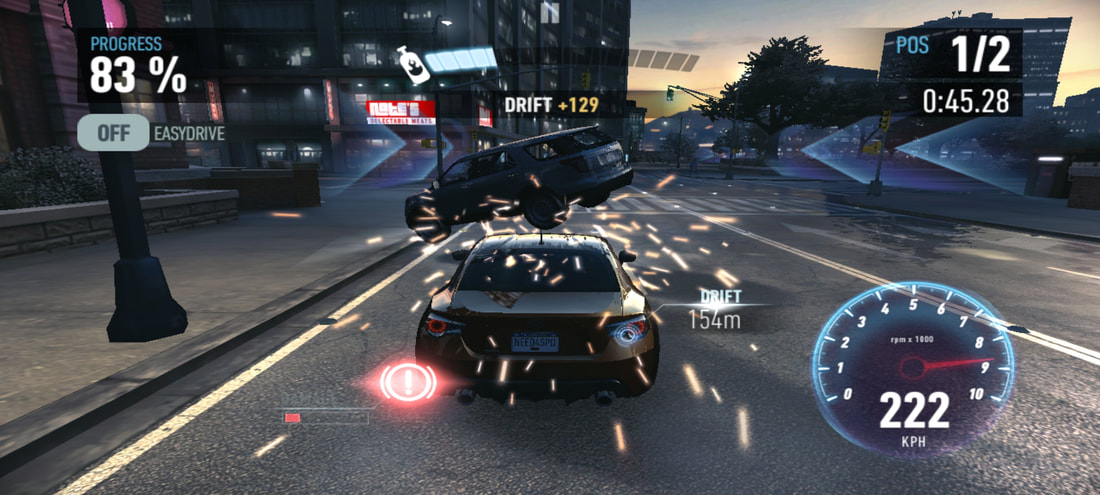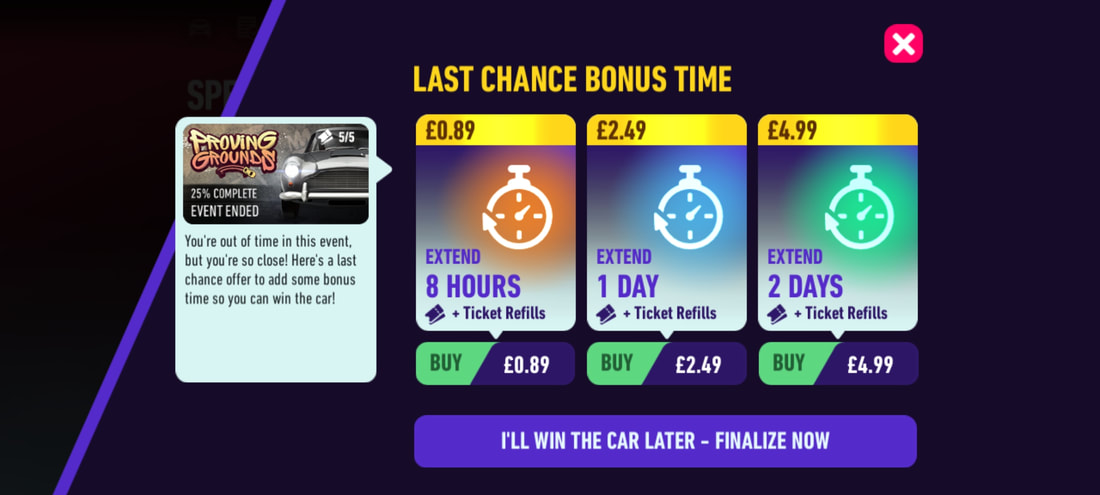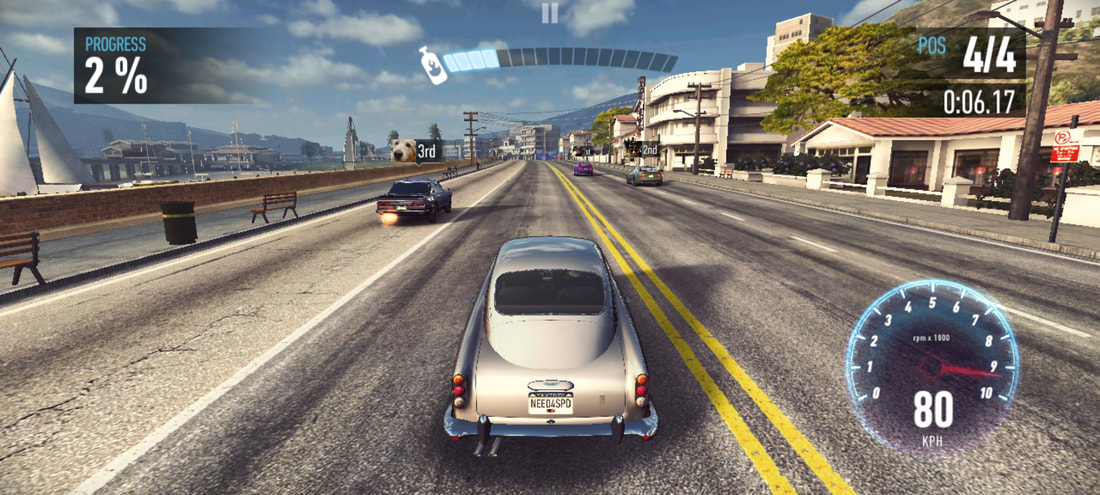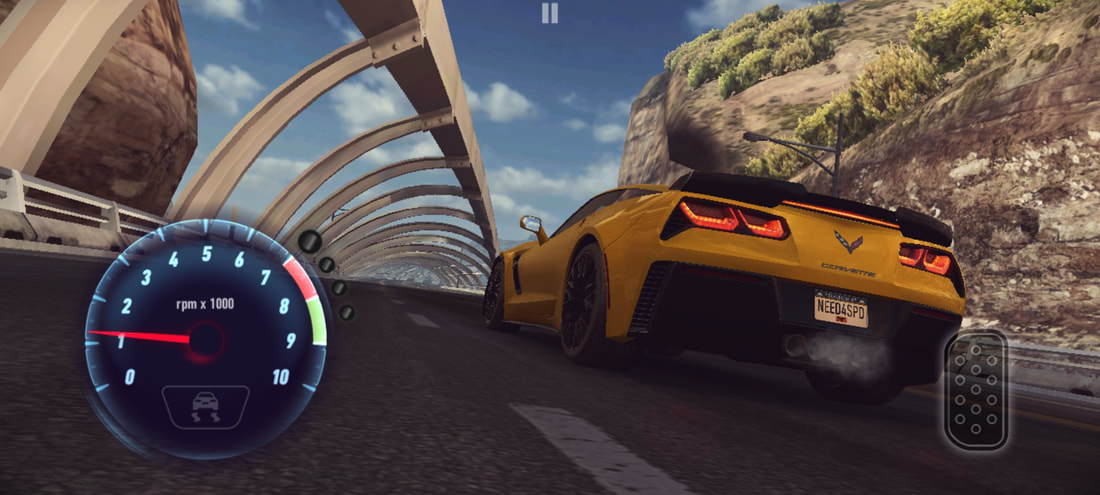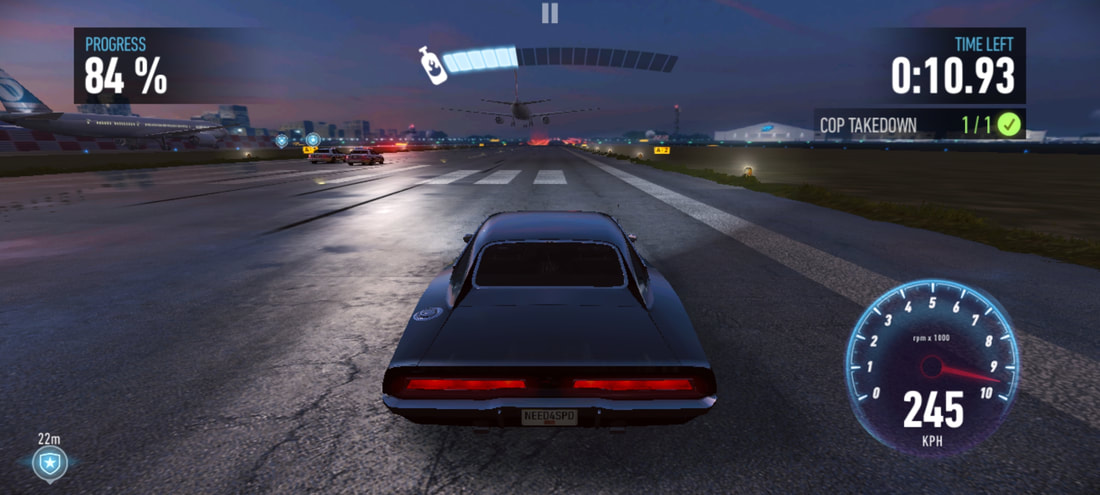NEED FOR SPEED: NO LIMITS (AND)
Android gaming has enjoyed significant growth throughout the second decade of the 21st Century. However, in failing to discourage microtransactions, loot box gambling and rampant advertising, many of the platform’s highest profile titles have become a by-word for exploitative practices. In Need for Speed: No Limits, we should be celebrating one of the most playable mobile racers on the market, because that’s exactly what it is. Sadly, the free-to-play model carpet bombs players with ads, whilst purposely stagnating progression as a lure to charging absurd amounts of money for small rewards that, in any other entry in the series, would simply be the reward for progression.
No Limits makes really good use of the touchscreen, delivering fast, fun mobile races with a satisfying immediacy. Unsurprisingly considering the series’ comfort zone in the decade preceding its release, NL opts to focus on street racing and an underground scene that draws duels, car deliveries and cop chases into the mix. The steering is excellent and it’s a surprise just how weighty and responsive cars feel. Manoeuvring is achieved through pressing the left or right sides of the touch screen, whilst swiping down instigates a drift and swiping up deploys nitrous. With no pedal functions (aside from timing revs on the start line), it may sound a little crude, but balancing slides and dodging traffic is plenty of fun, whilst the pace of the game is enough to keep you engaged without feeling overwhelmed.
No Limits shows how far mobile gaming has come on a technical level... and how far it has regressed in terms of exploitative practices
Races are a little brief, typically lasting between 30 and 50 seconds, though they encompass a decent range of Need for Speed settings. It delivers the narrow, night-time city staples emblematic of the Underground era, as well as the undulating canyon passes more familiar with Criterion’s entries. There are even a few rural settings that work a pretty mix of autumnal woodlands and covered bridges, somewhat reminiscent of The Run. The most showstopping track by a distance however is the airport. It’s unusual to say the least, playing host to a truly grandstanding finale, with the race culminating on a vast runaway with planes launching overhead.
A lengthy story mode comes stuffed with dozens of missions comprising street races, one-versus-one chases and police escapes, among others. There’s a degree of satisfaction to defeating rivals, not least because finishing certain chapters opens up new gameplay avenues and customisation possibilities. This all hints at slightly more variety than the gameplay delivers, but each setup works well enough in its own right. Whilst the handling doesn’t offer much in the way of distinguishable characteristics across its large range of motors, the controls are neither leery nor unpredictable and even when faced with tight or technical courses, mistakes rarely stem from a lack of dependable controls.
A lengthy story mode comes stuffed with dozens of missions comprising street races, one-versus-one chases and police escapes, among others. There’s a degree of satisfaction to defeating rivals, not least because finishing certain chapters opens up new gameplay avenues and customisation possibilities. This all hints at slightly more variety than the gameplay delivers, but each setup works well enough in its own right. Whilst the handling doesn’t offer much in the way of distinguishable characteristics across its large range of motors, the controls are neither leery nor unpredictable and even when faced with tight or technical courses, mistakes rarely stem from a lack of dependable controls.
FOCAL POINT: MICROTRANSACTIONS HALL OF SHAME
In a feature I fear may become entirely ubiquitous with our coverage of free-to-play titles, it’s time to take a closer look at the dubious practices masquerading as in-app purchases. In less flattering terms: loot boxes, low-level gambling and the necessity for microtransactions to smooth out progress. You’ll be entirely unsurprised to hear EA are thoroughly guilty of all of these. Whilst the game loves to bandy around its secondary currencies, blueprints and promises of upgrades, the reality is this: it routinely charges in the region of £10 to £25 for individual cars, together with an insignificant allocation of in-game currency. There are no genuine content packs, just a smoke-screen of ‘gold shipment’ plans that sleepwalk money from the player, subscription-style. Whilst some cars can be won from special events, these are designed to prevent non-paying players from succeeding, regardless of skill level. This it achieves through the one-two punch of absurd event time limits combined with the repeated and obvious road-blocking of player progress. You guessed it, there’s the sinister presence of premium loot boxes too, offering the chance of blueprints, which might contribute towards that new car you’ve been after.
Inevitably, No Limits can’t compete with its big-screen siblings for depth or immersion, but it does capture a fair chunk of their racing spirit. Both the courses and the cars look super, a real showcase for how far visual quality and performance have come in mobile gaming. It’s fairly nicely presented, but with so much exposition between upgrade boxes, garage customisation, events, story, online and the innumerable attempts to coax the player into purchasing packs, it’s less streamlined than it should have been. You’ll spend as much time navigating menus as racing. That said, there is a surprisingly good online mode, which sees the player racing against others’ ghosts for what are some decent prizes.
Sadly, we have to confront the issue of monetisation. No Limits commits just about every sin of monetisation in the book. Should you resist the myriad of expensive currency offers or VIP Packs for the first few days, you’ll notice a considerably more active shoehorning of ads after most races. The ‘reward’ for having to sit through an ad is as small as EA could have proffered: one solitary gold piece. The ads are jarring and intrusive, though they don’t directly impinge on the gameplay. Unfortunately, there are plenty of other factors that do.
Sadly, we have to confront the issue of monetisation. No Limits commits just about every sin of monetisation in the book. Should you resist the myriad of expensive currency offers or VIP Packs for the first few days, you’ll notice a considerably more active shoehorning of ads after most races. The ‘reward’ for having to sit through an ad is as small as EA could have proffered: one solitary gold piece. The ads are jarring and intrusive, though they don’t directly impinge on the gameplay. Unfortunately, there are plenty of other factors that do.
Multi-day special events exist to dangle the carrot of new cars in front of the player, rolling out dirty tactics galore to render rewards more theoretical than realistically achievable. The game caps the number of races that can be contested at any one time, with a maximum of five available at one time (with a 45-minute replenishment time for each). Make progress early on and the game will make you wait for the next chapter. By the final day, you’re left with the absurd task of completing 19 races in 24 hours whilst having to replay countless events in the hope of collecting the necessary upgrades needed to meet performance criteria. When inevitably you fail to best this mathematically unlikely challenge, EA adds insult to injury with a screen implying that one way of improving your performance is to buy time, extending the ridiculous deadlines with real-world cash. It’s pay-to-win at its most egregious.
I realise, there’s bound to be someone reading who is thinking: “but loads of mobile games adopt this strategy and are successful!”. Let’s establish something, early doors, as I sense this is likely to be a recurrent theme when examining the shortcomings of free-to-play Android titles. We’re judging the quality of the experience, not the success of the business model. Just because a lot of titles make the same mistakes, doesn’t mean we overlook them en masse simply because their methods gross a lot of money. That isn’t our concern. It was EA’s choice to benefit their coffers at the expense of the gaming experience. There are lots of mobile racers available for under £5 and they’re not designed to resist a player’s progress, drown them in loot boxes, shove advertisements down their throat every 45 seconds or encourage gambling for near non-existent rewards.
I realise, there’s bound to be someone reading who is thinking: “but loads of mobile games adopt this strategy and are successful!”. Let’s establish something, early doors, as I sense this is likely to be a recurrent theme when examining the shortcomings of free-to-play Android titles. We’re judging the quality of the experience, not the success of the business model. Just because a lot of titles make the same mistakes, doesn’t mean we overlook them en masse simply because their methods gross a lot of money. That isn’t our concern. It was EA’s choice to benefit their coffers at the expense of the gaming experience. There are lots of mobile racers available for under £5 and they’re not designed to resist a player’s progress, drown them in loot boxes, shove advertisements down their throat every 45 seconds or encourage gambling for near non-existent rewards.
The airport track is utterly brilliant, seeing races culminate on a runway as planes take off overhead
Had EA simply sold No Limits as a one-off purchase, it would undoubtedly have ranked among the best mobile racers, because it looks great and fits the mobile environment to a tee through an innovative and effective control scheme. Sadly, it hides behind the fascade of free-to-play, doing everything to hinder those who don’t fall for its money-grubbing. No Limits is a deeply ironic name for a game that is, in every facet of its play, constricted by monetary gatekeeping. For the cost of two or three of its cars, you could instead buy all of the eighth-gen Need for Speed games. No Limits is thoroughly damaged by its greedy practices, reducing a technically impressive racer to little more than a disappointing distraction.
|
|
VERDICT
"No Limits is an ironic name for a game that is, in every facet of its play, constricted by monetary gatekeeping. What should have been remembered as a technically impressive racer will instead go down as a disappointing distraction." OVERALL: 6/10 |

